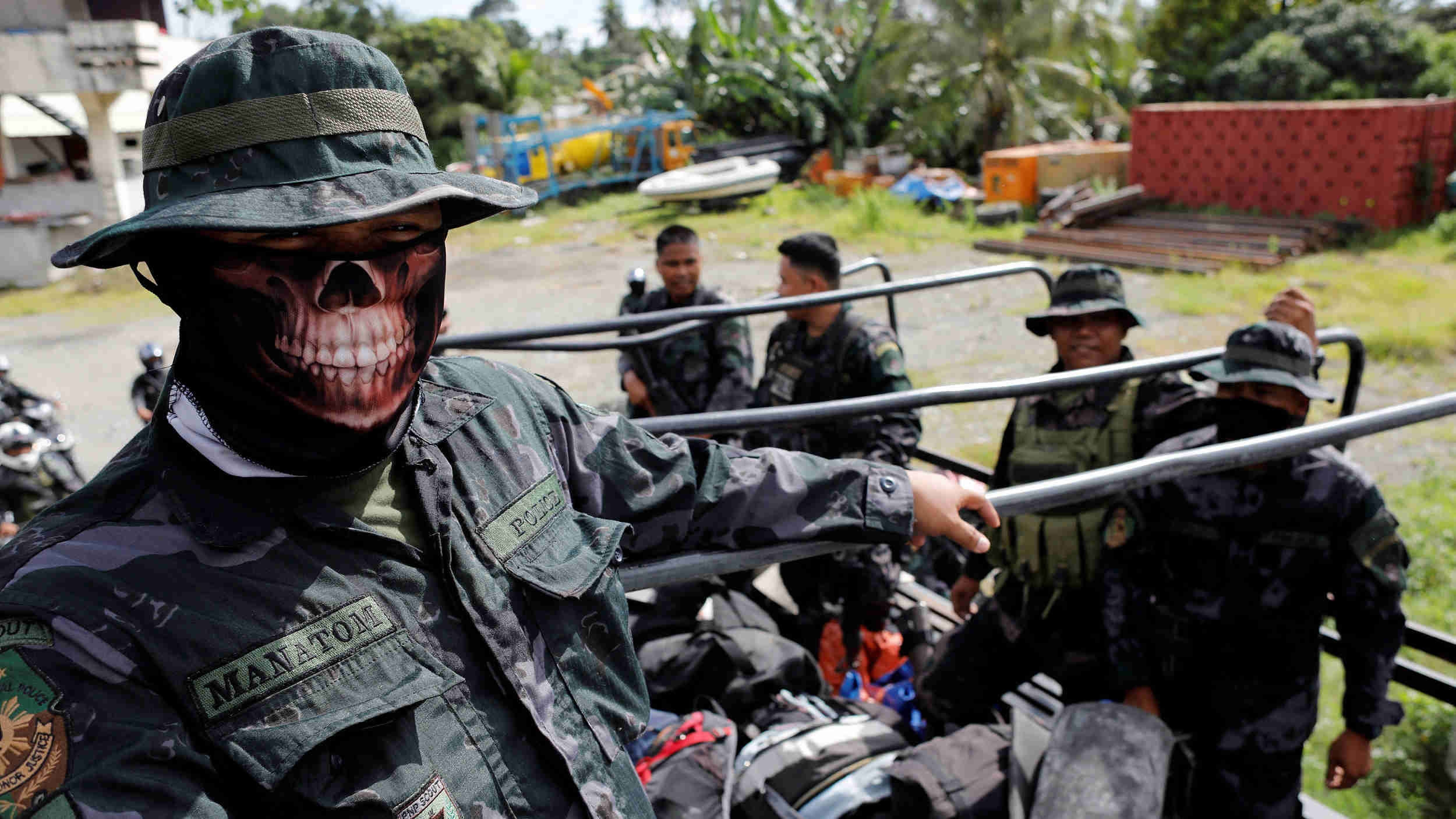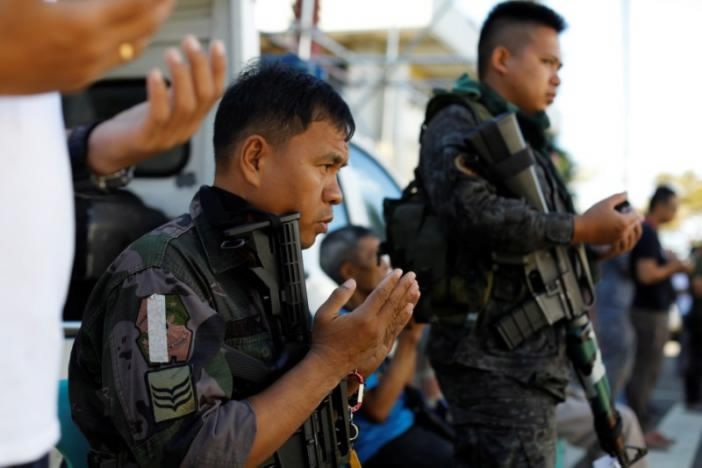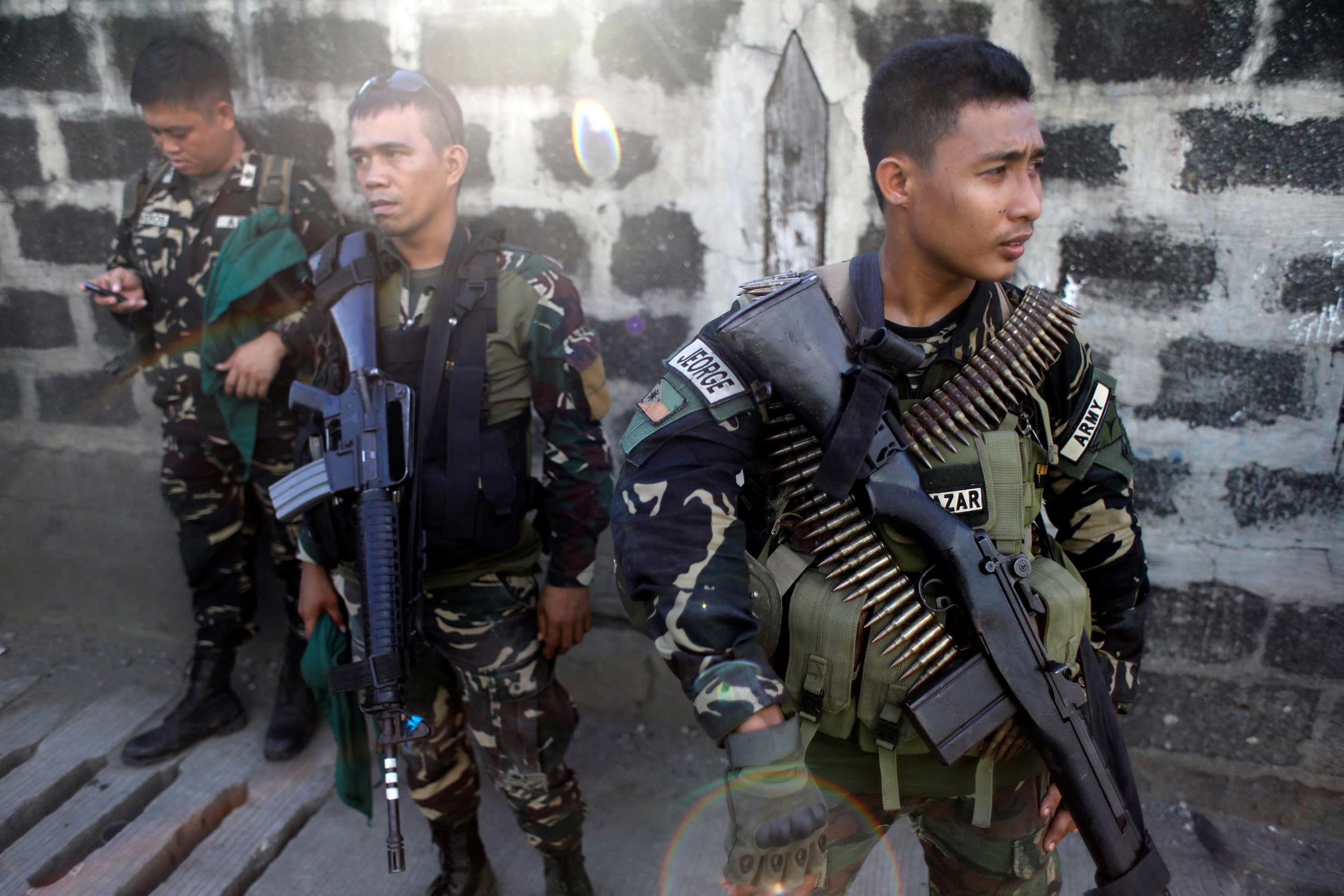
Politics
14:55, 25-Jun-2017
Battle for Philippine town abates as troops mark Islamic holiday

Fighting between government forces and Islamist rebels holed up in the heart of a southern Philippine town eased on Sunday as the military sought to enforce a temporary truce to mark the Eid al-Fitr Islamic holiday.
Small skirmishes took place early in the day in parts of Marawi City, where fighters loyal to ISIL were clinging on for a fifth week, as rebel snipers fired on positions held by troops who declared a unilateral, eight-hour halt on offensives until early in the afternoon.
Muslims attended prayers at a Marawi mosque in an emotional gathering marred by the violence that has displaced some 246,000 people, and killed more than 350 people, most of them rebels, and about 69 members of the security forces.

Philippine police officers perform Eid al-Fitr prayers outside a mosque inside city hall compound as government forces continue their assault against insurgents from the Maute group, who have taken over large parts of Marawi City, Philippines June 25, 2017. /Reuters Photo
Philippine police officers perform Eid al-Fitr prayers outside a mosque inside city hall compound as government forces continue their assault against insurgents from the Maute group, who have taken over large parts of Marawi City, Philippines June 25, 2017. /Reuters Photo
Twenty-six civilians have been killed but officials believe scores of bodies of residents may still be in the heart of a conflict zone battered for weeks by air strikes and artillery bombardments.
"This is supposed to be a day of happiness," said Imam Aleem Ansari Abdul Malik, who led Sunday's prayers.
"Families should be together but they were torn apart by violence, some lost their loved ones and thousands are in evacuation centers."
He reminded Muslims to shun the advances of radical groups.
"This is just a small fire, do not allow the flames go bigger by joining extremists," he said.
Big ambitions

Philippine army soldiers pause while patrolling in Iligan, as government forces continue their assault against insurgents from the Maute group, who have taken over large parts of Marawi City, Philippines June 24, 2017. /VCG Photo
Philippine army soldiers pause while patrolling in Iligan, as government forces continue their assault against insurgents from the Maute group, who have taken over large parts of Marawi City, Philippines June 24, 2017. /VCG Photo
The seizure of the town by the Maute group and its affiliates has caused the biggest internal security crisis in decades for the Philippines, and a realization that the long-feared arrival of ISIL could be a reality.
Images of black-clad fighters and ISIL flags flying in Marawi has caused alarm in the mainly Roman Catholic nation, and the protracted occupation and presence of foreign fighters suggests the militants may have bigger designs on the southern Philippines than previously imagined.
On Saturday, gunfire rang out across the lakeside town as aircraft dropped a succession of bombs, setting buildings ablaze and sending bursts of debris and smoke into the sky behind mosque minarets and charred buildings.
A military official said on Saturday more than 100 Christians could be hostages, including a priest, according to information provided by eight residents who escaped their captors during a Friday air strike.
Conditions for those trapped in Marawi have been dire, with witnesses reporting bodies on streets, food and water in short supply and a constant threat of being killed by either the militants, or bombs dropped by government aircraft.
The threat of ISIL gaining a foothold in the Philippines has been raised by their losses in Syria and Iraq, and intelligence reports that the militants are seeking new bases from which to project their agenda.
Though the military is confident it can retake Marawi soon, the level of the militants' preparations, combat capability and resilience has created some trepidation about whether their assault could be the beginning of a wider campaign.
Lieutenant Colonel Emmanuel Garcia, head of civil-military operations in Western Mindanao island, said on Saturday there were "strong indications" that three of seven brothers of the Maute family had been killed, as had a top Malaysian operative, Mahmud Ahmad, who is believed to be central to the group's fundraising.
However, Garcia told reporters concrete evidence was still lacking. He said Abdullah Maute and Isnilon Hapilon, the ISIL appointed "emir" of Southeast Asia, were no longer calling the shots in Marawi.
"Based on intelligence information on the ground, they have evacuated their top leadership from the city's commercial center due to intense bombings and artillery shelling," he said.
(Source: Reuters)
3638km

SITEMAP
Copyright © 2018 CGTN. Beijing ICP prepared NO.16065310-3
Copyright © 2018 CGTN. Beijing ICP prepared NO.16065310-3